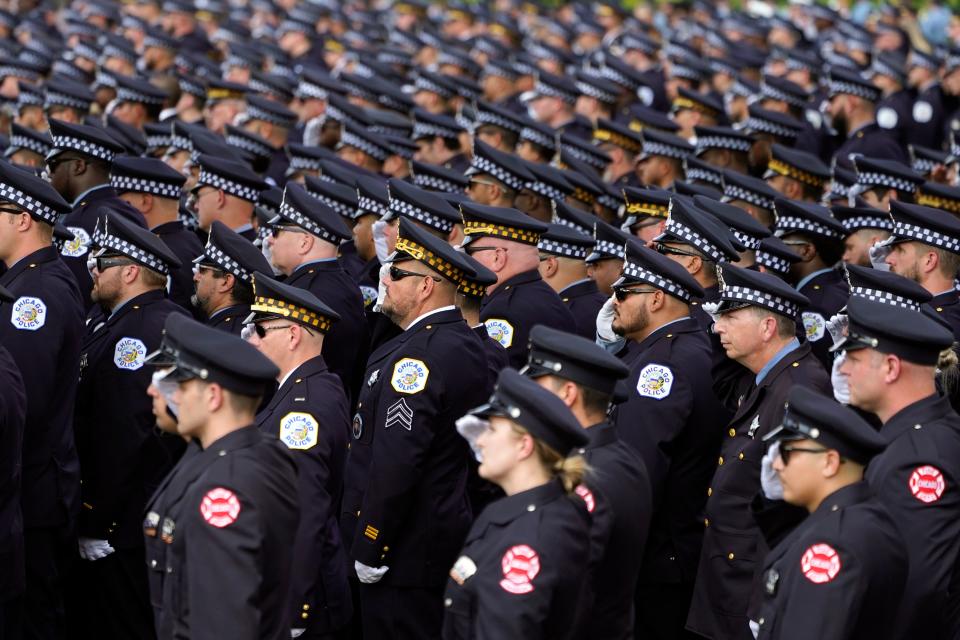COVID-19 disruption, crime wave, 'defund police' mantra help fuel recent cop killings
Who would want to become a police officer nowadays? If you’re not getting suspended, terminated or even prosecuted for making a poor split-second decision in a high-pressure situation, there is what appears to be an increasing likelihood of being injured or killed on the job.
The news has been littered with tragic stories of police officers being gunned down in the line of duty. Earlier this month at Bridgewater College in Virginia, a pair of officers responding to a report of a suspicious person on campus was shot and killed by a former student. New York’s finest has been hit hard by several recent fatalities, including two young officers who were killed while responding to a risk-filled domestic violence call. And just recently, nine Phoenix police officers were injured – five by gunfire and the others from flying shrapnel – when ambushed during a domestic violence incident.
Is there a war on cops?
The danger facing the police can be seen in more than just a handful of cases making headlines. Last year, 73 law enforcement officers were fatally assaulted in the line of duty, according to the FBI, a striking nearly 60% jump over the number killed in 2020 and over 40% more than the average of the prior 10 years.
No surprise that some officers (and even some members of the news media) believe there to be a “war on cops" – one in which they are on the losing side.
Even though the spike in officer shootings and killings is a recent phenomenon, there are several factors that have contributed to it, some related to the COVID-19 pandemic and recent increase in crime.
The onset of the pandemic and the associated lockdowns have exacerbated an array of social problems: domestic violence, gun violence, alcohol consumption, substance abuse and mental illness. These, combined with the widespread stress and anxiety associated with the pandemic, have created a more challenging landscape for law enforcement.
In addition, because of their frequent interactions with the public, the police have a high risk of contracting COVID-19, which was responsible for nearly 70% of officer deaths last year.
During the past two years, but especially since the brutal murder of George Floyd in Minneapolis, criticism of the police has escalated. The belief that lethal force is used intentionally and significantly more against communities of color has many citizens embracing the "defund the police" rallying cry.
However, this perception of rampant racism is due, in part, to a lack of clarity regarding the extent to which the police exert lethal force, at whom and under what circumstances, as well as not considering the population with whom the police have the most contact.
Drum majors for change: Civil rights leaders of 1961 teach us to confront injustice
In addition, video recordings of police-citizen encounters going viral that show the bad and the ugly actions of the police – but rarely the good – have further strained relations between the police and the communities they serve.
Although there has been some progress in reforming policies governing the use of force and practices for how the police respond to individuals in distress, the ill-defined “defund the police” mantra can demonize those individuals who care deeply about their communities and want to work collaboratively with them to enhance public safety.
Perhaps instead, the focus should be: What do we want the police to do, and how do we want them to do it? That would go a long way toward achieving a cease-fire in the so-called war on cops.
Unsure future for our law enforcement
Although there are plausible explanations for the 2021 rise in cop killings, it is important not to presume that a one-year spike will become a long-term trend. An unusually large increase in violence can prove to be, at least in part, a temporary aberration. We have seen that before.

In April 2012, The New York Times ran a story about a rise in police fatalities, citing FBI figures indicating that “72 officers were killed by perpetrators in 2011," a 25% increase from the previous year and a 75% increase from 2008. The following year saw a drop back to 49. Even crime has gravitational pull: What goes up generally comes down.
Rooting out police misconduct: We know why innocent people are wrongfully convicted, so we fight for their right to sue police

There is, of course, no guarantee that the 2021 spike in police fatalities will dissolve just like the one a decade earlier did. Predicting the future is a tough business. But we can certainly hope that patrolling the streets of America’s cities will soon become a little safer for the men and women in blue than it was last year, and that the police and community stakeholders can work in partnership, as is the case in Dallas and Miami, to control the scourge of violent crime.
James Alan Fox, the Lipman Professor of Criminology, Law, and Public Policy at Northeastern University, is a member of the USA TODAY Board of Contributors.
Alex R. Piquero is Chair of the Department of Sociology and Criminology and the Arts & Sciences Distinguished Scholar at the University of Miami.
This column is part of a series by USA TODAY Opinion about police accountability and building safer communities. The project began in 2021 by examining qualified immunity and continues in 2022 by examining various ways to improve law enforcement. The project is made possible in part by a grant from Stand Together, which does not provide editorial input.
You can read diverse opinions from our Board of Contributors and other writers on the Opinion front page, on Twitter @usatodayopinion and in our daily Opinion newsletter. To respond to a column, submit a comment to letters@usatoday.com.
This article originally appeared on USA TODAY: Cop killings: More police are getting killed in the line of duty

